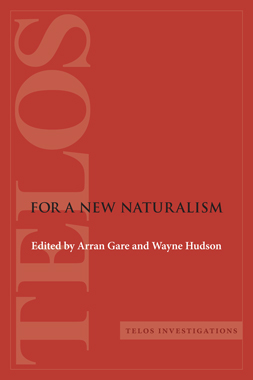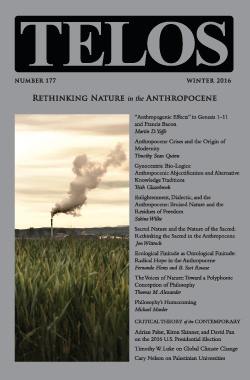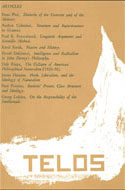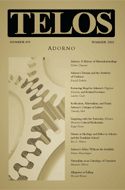By Wayne Hudson and Arran Gare · Tuesday, February 6, 2018 For a New Naturalism, edited by Arran Gare and Wayne Hudson, is now available from Telos Press in our online store. Order your copy today and save 20% on the list price by using the coupon code BOOKS20 during the checkout process.
Contemporary political and social theory needs to be rethought with reference to posthistorical conditions and developments in the natural sciences. More emphasis needs to be placed on a wider naturalism that goes beyond modern objectivating naturalism: a naturalism that opens up to both differential naturalisms and to differential humanities. In place of critique without concrete alternatives and American identity politics, a version of enlightenment is needed that stands for the rational reform of human affairs in all areas. This enlightenment is not the mainstream European Enlightenment of the eighteenth century. It is not hostile to indigenous and premodern social traditions, but seeks to learn from them. Nor is it confined to Western social thought or to a political thought based on the citizens of cities. This enlightenment engages with the sciences and with global historical dynamics.
Continue reading →
By Telos Press · Friday, September 1, 2017 Telos Investigations is a new book series that collects papers delivered at Telos-Paul Piccone Institute conferences. The first volume in the series, For a New Naturalism, edited by Arran Gare and Wayne Hudson, is now available for purchase in our online store. Save 20% on the list price by using the coupon code BOOKS20 during the checkout process.
 Western civilization has been afflicted by a divide between the sciences and the humanities, a divide that has been harmful to both. The first volume in our new Telos Investigations series, For A New Naturalism elaborates the implications of recent developments in natural philosophy that challenge both Cartesian dualism and reductionism. The contributors to this volume write from a variety of political, philosophical, and scientific standpoints. They all agree, however, that a civilization based on reductionist naturalism, with its impoverished understanding of both human life and the universe, is failing to generate the political and social thought we need. And they all support the need for a wider naturalism than the objectivating naturalism that emerged in seventeenth-century Europe. In addressing the contested status of naturalism in contemporary philosophy, the contributions to this volume question both prevailing assumptions about nature and assumptions about what is knowledge. They argue for a new alliance between science and the humanities, and spell out some of the implications of this challenge for philosophy, society, and religion. Western civilization has been afflicted by a divide between the sciences and the humanities, a divide that has been harmful to both. The first volume in our new Telos Investigations series, For A New Naturalism elaborates the implications of recent developments in natural philosophy that challenge both Cartesian dualism and reductionism. The contributors to this volume write from a variety of political, philosophical, and scientific standpoints. They all agree, however, that a civilization based on reductionist naturalism, with its impoverished understanding of both human life and the universe, is failing to generate the political and social thought we need. And they all support the need for a wider naturalism than the objectivating naturalism that emerged in seventeenth-century Europe. In addressing the contested status of naturalism in contemporary philosophy, the contributions to this volume question both prevailing assumptions about nature and assumptions about what is knowledge. They argue for a new alliance between science and the humanities, and spell out some of the implications of this challenge for philosophy, society, and religion.
Continue reading →
By Jon Wittrock and Richard Polt · Monday, December 12, 2016 Telos 177 (Winter 2016) is now available for purchase in our store.
 While the term Anthropocene was used in the USSR already in the 1960s to refer to the late Quaternary era, it rose to prominence more recently when introduced by Eugene F. Stoermer and Paul J. Crutzen. As the very word indicates, this is an epoch when humanity has taken center stage in the sense that its activities now have a major, global, and lethal impact. The shadow of human-caused global destruction and mass death haunts this epoch, and indeed, humanity’s newly acquired capacity for devastation is one of the Anthropocene’s most marked traits. While mass extinctions are hardly new phenomena and while the specter of the extinction of humanity due to some sudden catastrophe was there even before human beings were aware of it in scientific terms, the actual capacity of humanity to extinguish itself along with a large swath of other species on the planet is new, and the stakes of human action are higher. While the term Anthropocene was used in the USSR already in the 1960s to refer to the late Quaternary era, it rose to prominence more recently when introduced by Eugene F. Stoermer and Paul J. Crutzen. As the very word indicates, this is an epoch when humanity has taken center stage in the sense that its activities now have a major, global, and lethal impact. The shadow of human-caused global destruction and mass death haunts this epoch, and indeed, humanity’s newly acquired capacity for devastation is one of the Anthropocene’s most marked traits. While mass extinctions are hardly new phenomena and while the specter of the extinction of humanity due to some sudden catastrophe was there even before human beings were aware of it in scientific terms, the actual capacity of humanity to extinguish itself along with a large swath of other species on the planet is new, and the stakes of human action are higher.
Continue reading →
By Lukas Szrot · Tuesday, March 24, 2015  Given the rich and diverse history in the discipline of philosophy, many a practicing philosopher might justifiably remark that insightful philosophical inquiry must withstand the test of time. Though “The Collapse of Philosophical Naturalism” was published in Telos in 1969, many of its insights remain highly relevant to conversations that continue in philosophical and sociopolitical circles today. Dale Riepe issues a damning critique, examining four at once distinct and kindred flaws in philosophical naturalism. Given the rich and diverse history in the discipline of philosophy, many a practicing philosopher might justifiably remark that insightful philosophical inquiry must withstand the test of time. Though “The Collapse of Philosophical Naturalism” was published in Telos in 1969, many of its insights remain highly relevant to conversations that continue in philosophical and sociopolitical circles today. Dale Riepe issues a damning critique, examining four at once distinct and kindred flaws in philosophical naturalism.
Continue reading →
By Telos Press · Monday, April 14, 2014 The Telos-Paul Piccone Institute has several important events in the works for 2014, including conferences and symposia in Melbourne, Australia, Beijing, China, L’Aquila, Italy, and Irvine, California. At the recent Telos Conference in New York City, David Pan, Executive Director of the Institute, outlined the themes for this year’s conference.
Continue reading →
By Maurizio Meloni · Friday, July 22, 2011 Maurizio Meloni’s “Naturalism as an Ontology of Ourselves” appears in Telos 155 (Summer 2011). Read the full version online at the Telos Online website, or purchase a print copy of the issue in our store.
 Scientific naturalism, according to Jürgen Habermas, represents one of the “two countervailing trends that mark the intellectual tenor of our age,” the other being religious worldviews. Using Foucault’s distinction between philosophy as an “analytic of truth” and philosophy as an “ontology of the present” and “ontology of ourselves,” this essay addresses naturalism less as an epistemological issue than as a global way of rethinking humanness, that is as the theoretical “correlative” of certain local practices, which, under the influence of leading sciences such as neuroscience and molecular biology, contribute today to the naturalization of the human. In the second part of the essay, I will discuss three hermeneutic models through which leading Continental thinkers have reacted to this intertwinement of naturalism and the human condition in modernity: naturalism as a break, as a danger, and as a loss. From their reactions, the antinaturalistic legacy of much of Continental philosophy emerges clearly, and invites us to think of the present naturalistic epoch in a more radical way. Scientific naturalism, according to Jürgen Habermas, represents one of the “two countervailing trends that mark the intellectual tenor of our age,” the other being religious worldviews. Using Foucault’s distinction between philosophy as an “analytic of truth” and philosophy as an “ontology of the present” and “ontology of ourselves,” this essay addresses naturalism less as an epistemological issue than as a global way of rethinking humanness, that is as the theoretical “correlative” of certain local practices, which, under the influence of leading sciences such as neuroscience and molecular biology, contribute today to the naturalization of the human. In the second part of the essay, I will discuss three hermeneutic models through which leading Continental thinkers have reacted to this intertwinement of naturalism and the human condition in modernity: naturalism as a break, as a danger, and as a loss. From their reactions, the antinaturalistic legacy of much of Continental philosophy emerges clearly, and invites us to think of the present naturalistic epoch in a more radical way.
Continue reading →
|
|


 Given the rich and diverse history in the discipline of philosophy, many a practicing philosopher might justifiably remark that insightful philosophical inquiry must withstand the test of time. Though “The Collapse of Philosophical Naturalism” was published in Telos in 1969, many of its insights remain highly relevant to conversations that continue in philosophical and sociopolitical circles today. Dale Riepe issues a damning critique, examining four at once distinct and kindred flaws in philosophical naturalism.
Given the rich and diverse history in the discipline of philosophy, many a practicing philosopher might justifiably remark that insightful philosophical inquiry must withstand the test of time. Though “The Collapse of Philosophical Naturalism” was published in Telos in 1969, many of its insights remain highly relevant to conversations that continue in philosophical and sociopolitical circles today. Dale Riepe issues a damning critique, examining four at once distinct and kindred flaws in philosophical naturalism.  Scientific naturalism, according to Jürgen Habermas, represents one of the “two countervailing trends that mark the intellectual tenor of our age,” the other being religious worldviews. Using Foucault’s distinction between philosophy as an “analytic of truth” and philosophy as an “ontology of the present” and “ontology of ourselves,” this essay addresses naturalism less as an epistemological issue than as a global way of rethinking humanness, that is as the theoretical “correlative” of certain local practices, which, under the influence of leading sciences such as neuroscience and molecular biology, contribute today to the naturalization of the human. In the second part of the essay, I will discuss three hermeneutic models through which leading Continental thinkers have reacted to this intertwinement of naturalism and the human condition in modernity: naturalism as a break, as a danger, and as a loss. From their reactions, the antinaturalistic legacy of much of Continental philosophy emerges clearly, and invites us to think of the present naturalistic epoch in a more radical way.
Scientific naturalism, according to Jürgen Habermas, represents one of the “two countervailing trends that mark the intellectual tenor of our age,” the other being religious worldviews. Using Foucault’s distinction between philosophy as an “analytic of truth” and philosophy as an “ontology of the present” and “ontology of ourselves,” this essay addresses naturalism less as an epistemological issue than as a global way of rethinking humanness, that is as the theoretical “correlative” of certain local practices, which, under the influence of leading sciences such as neuroscience and molecular biology, contribute today to the naturalization of the human. In the second part of the essay, I will discuss three hermeneutic models through which leading Continental thinkers have reacted to this intertwinement of naturalism and the human condition in modernity: naturalism as a break, as a danger, and as a loss. From their reactions, the antinaturalistic legacy of much of Continental philosophy emerges clearly, and invites us to think of the present naturalistic epoch in a more radical way. 






